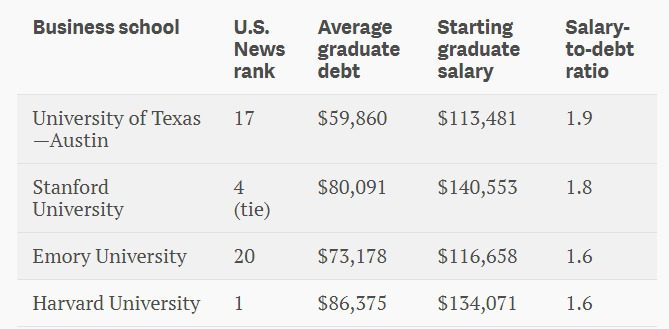Metro News & Notes: Return on Investment, Firing CEOs and More

Good morning and happy Friday!
Here are a few stories you may have missed from the week that was …
It Doesn’t Really Matter Where You Go To Business School | Quartz
In a particularly dismissive yet enlightening piece from Quartz writer Amy X. Wang, it seems there is a decent discrepancy between how business schools are ranked and the return of investment for an average student.
Wang specifically cites business school rankings from U.S. News & World Report, arguably the most well-known graduate school ranking system in the world today. Its rankings, however, do not necessarily correlate to return on investment.

Rankings courtesy of U.S News/Quartz
The higher-ranked a school, the better odds there were that applicants would earn a solid starting salary. But the top 20 rankings begin to scatter when cost and return on investment are accounted for, with the McCombs School of Business at the University of Texas, Austin, coming in at first overall despite ranking 17th overall in the U.S. News ranking. McCombs grads leave school with an average debt of $59,860—significantly less than most high-ranking schools. In contrast, grads from the MIT Sloan School of Management (ranked 4th overall by U.S. News) leave with a slightly better average salary than McCombs grads, but also have an average debt of $121,822.
Read more about Wang’s findings here …
New UCI Study Explains Why Some “Tarnished” CEOs Get the Boot, While Others Don’t
Letting go of a CEO from a major company isn’t a simple decision. In their research, Libby Weber, Associate Professor at the UCI Paul Merage School of Business, and Dean’s Professor Margarethe Wiersema find that media scrutiny and personality make the decision a bit more complex.
The study, titled “Dismissing a Tarnished CEO? Psychological Mechanism and Unconscious Biases in the Board’s Evaluation,” was recently published in the California Management Review. In which, Wiersema says, “The media can put a board in the unaccustomed position of being the focus of intense public scrutiny. However, boards in the limelight are subject to various cognitive biases, rather than objective rationality, that can easily cloud their judgement.”
“By modeling the psychological processes that shape how corporate misconduct or poor performance is perceived and evaluated by the board, our study provides a more complete understanding of why some CEOs are dismissed while others are not, even when very similar infractions occur. It also identifies decision factors boards should consider, which will serve to help streamline the dismissal process and more fairly balance the outcomes.”
Read more of Wiersema and Weber’s findings here …
5 Burning Questions about Getting into Business School | Business Insider
In a recent interview with Business Insider, New York University Stern School of Business Associate Dean of MBA Admissions Isser Gallogly, spoke about what he believes is necessary to find in a “winning application,” deciding on going full-time or part-time and much more.
Gallogy notes that those deciding between full-time and part-time MBA programs must consider the immersive advantages one earns when devoting a full-time schedule. “With a full-time program, there’s more investment in terms of the cost because you’re forgoing income but you have more time to invest in the program,” he says. “With part-time, you’re obviously keeping your job, keeping your income, so there’s less opportunity cost, but on the flip side, you have less time to go to business school and get engaged and involved.”
When it comes to essays, considering he’s read thousands, Gallogy’s advice is simple: stick to the point. “I always say ‘AQA:’ Answer the question asked. That said, make sure you get across who you are in this essay.”
Read more advice from Gallogy here …
